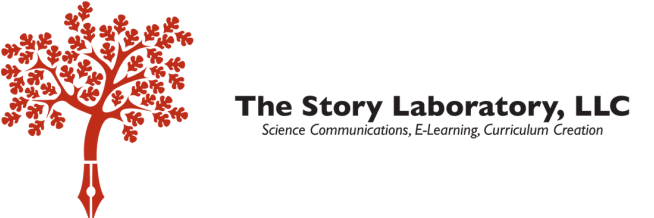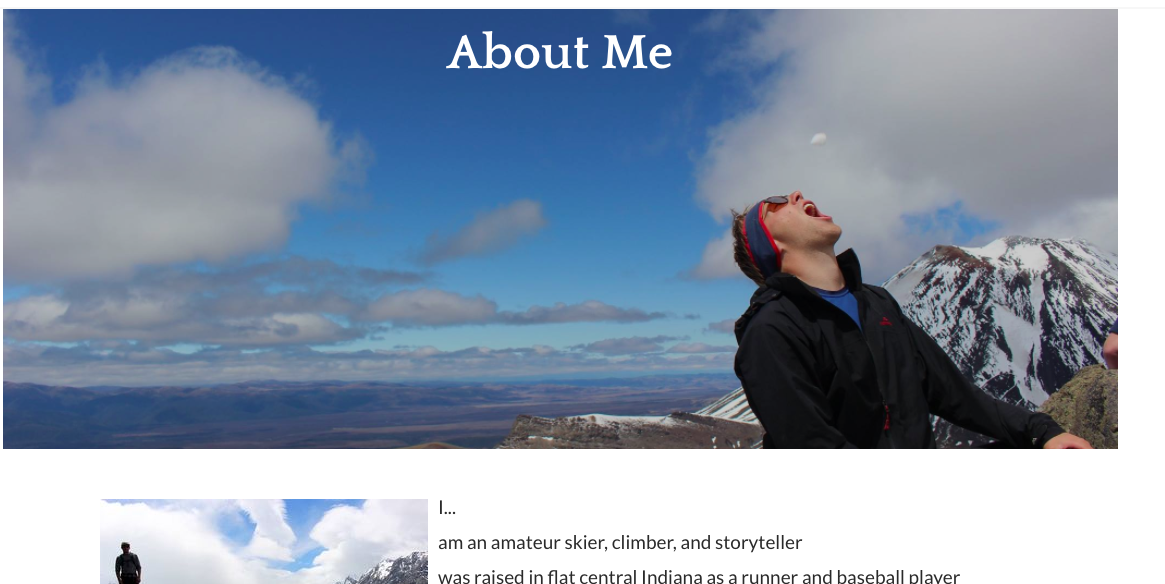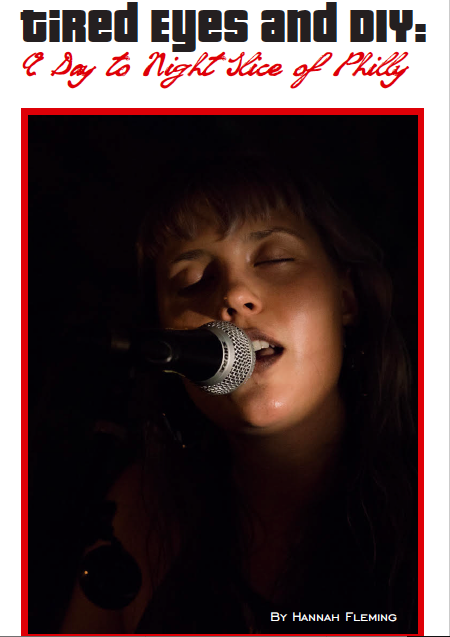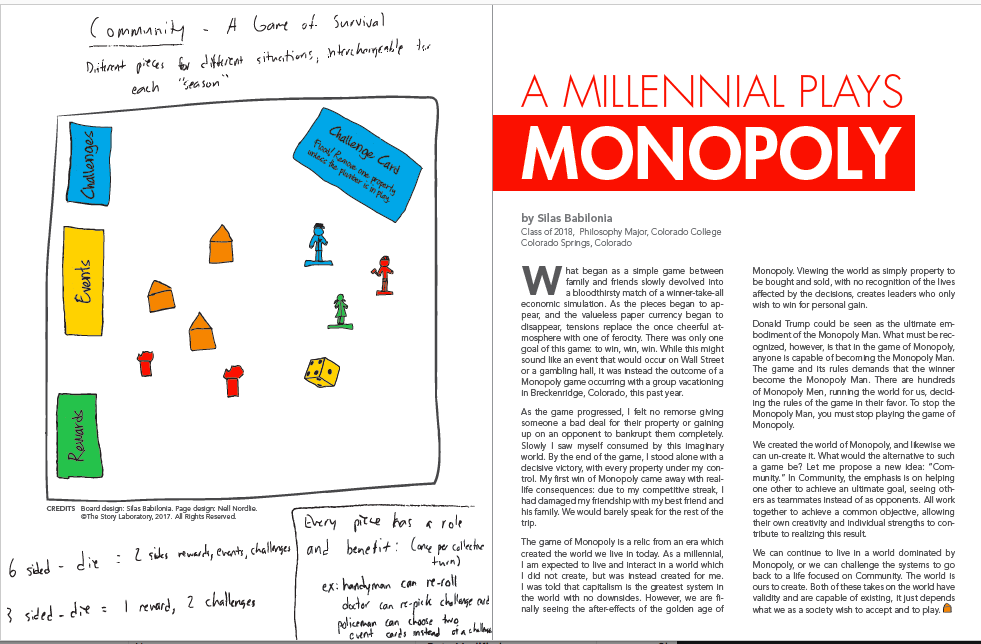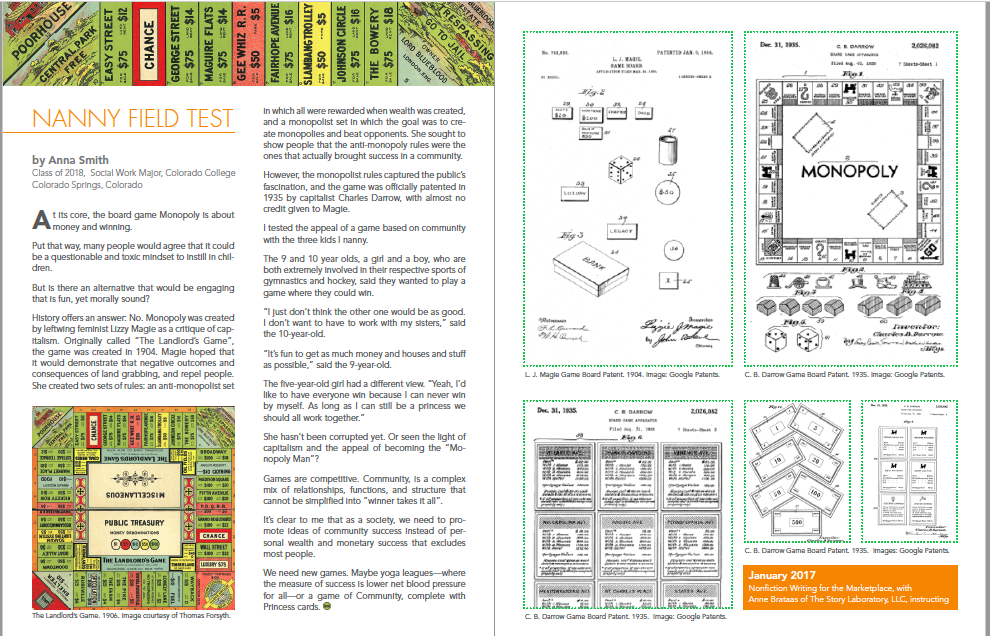Writer Anne Brataas in her Pop-up College Prof role at Colorado College (CC), January 2017. She is workshopping a fine piece of thinking and writing by Portland, Ore., CC sophomore and cognitive neuroscience major, Kate Barnes, on the history of infinity.
Photo Credit: Silas Babilonia.
Photo Credit: Silas Babilonia.
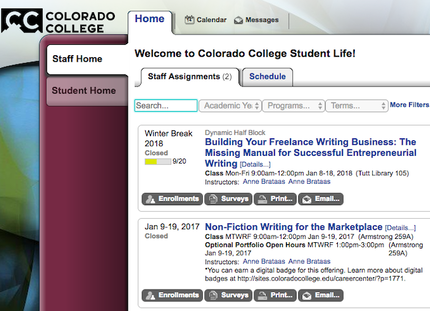
Anne's pop-up teaching comes to you. Over the past 10 years, she has travelled to join college faculty as "practicing pro" writer-in-residence to teach short-course intensive science writing, digital media and web writing design-and-build workshops at the nation's leading colleges and universities. Non-fiction mostly, but all words and ways of effective 21st century communication are fit subjects for Anne's workshops.
Entrepreneurial & Artistic Success
Anne's goal is to help entrepreneurial writers, illustrators, video, 3D animation, AR and photo artists, designers and thinkers of all backgrounds graduate fully prepared to launch successful market-ready writing practices. In 2019, she expanded her teaching outreach through her new 501c(3) nonprofit charity, Minnesota Children's Press to include instruction on how to publish books written and illustrated by children. This is now her priority through her Pandemic Publishing Project 2020-2021.
Pioneering Disruptive Publishing
In one CC class, students helped Anne workshop a novel disruptive publishing and distribution model she is developing for her children's book series about a cuddly-looking mammal native to Madagascar, the tenrec named Mirabilis Rain McMammal – Mira for sort. Mira is an environmental detective who is blown off course during the rigors of her investigations, and now finds herself lost – and delightfully so – and utterly at home in the world, teaming up with other animals to solve its many environmental problems. Mira's Big Day of Wonder.
A class-favorite teaching point relates the origin story of how Anne took her Mira prototype book away from a meeting with a New York publisher in 2015 after the literary agent asked, "Why did you name her Mira? Did you Google names before you named your character?" Anne's response, as she walked out the door: "Did you read the first 20 words of the book?"
Real World Publishing Case Studies
While the case study method is legendary pedagogy at the world's leading business schools (Harvard's MBA school pioneered this approach) genuine live-product case study teaching is not practiced in publishing. The reason: the field is too fractured and siloed. In the Big Book industry, antiquated, other-century model of discrete personal networks and sales' data profiles determine what a children's book is about, how it looks, where it is printed, how it is priced and sold. Not here! Anne and her students are changing that!
Prior to the COVID-19 pandemic of 2020, one highly practical and popular in-person course Anne taught is The Writer as Entrepreneur: Building Your Professional Portfolio. In it she mentored, coached, tutored, ran a pitch clinic, led resume and cover letter tutorials for 9 days at Colorado College (CC) in Colorado Springs during its "Dynamic Half Block," January 9-19, 2017.
2021 Master Classes
For 2021, Anne is busy adapting her signature highly creative, immersive, crackling-energy, in-person teaching style – she's a pracitioner of embodied, motion-based learning in the finest tradition of Aristotle's Lyceum, known as Peripatos; walking learning--to COVID-19 safe methods.
Colorado College
Half Block is a transition time after the holiday break before CC's formal school year resumes its unique calendar of block scheduling. Under CC's Block Plan–the first in the U.S.–a class meets every day for 3.5 weeks of immersive learning that covers the equivalent of a semester's worth of content in a traditional college calendar. Every student starts class on a Monday morning and ends 3.5 weeks later at noon on Wednesday.
CC students take just one class at a time each block--and it shows. Their focus and followthrough on a compressed time schedule--a realistic, professional working writer's timeline--is impressively productive. These students are job-ready and work-worthy. Bring on the pros.
As a member of the CC Class of '76, Anne belongs to the first graduating class to have experienced a full four years of Block Plan learning. She is a fierce champion of its deep learning advantages she experienced as a student--and now, of its deep teaching advantages she experiences as a visiting professor. Done right and well, the Block Plan sparks and supports such creative collaborative learning, who really needs to go skiing?
It was at CC that Anne first heard this immobilizing sentence: "You're going to live like writers for the next seven weeks." It was Mr. Yaffe's two-block class in creative writing. He was right. Students lived like writers day and night, day and night. Story after story, speed draft after speed draft. Critiques and read-alouds were followed by more speed writing, merciless revisions, endless wondering from where and how the ideas and words would arise, move, connect. From the demands of Block Plan focus and time compression that constructs confident voices under pressure, writers emerge. Anne has been at it ever since.
A sampling of student projects created during the 9 days of Anne's 2017 The Writer as Entrepreneur: Building Your Professional Portfolio class is below:
Entrepreneurial & Artistic Success
Anne's goal is to help entrepreneurial writers, illustrators, video, 3D animation, AR and photo artists, designers and thinkers of all backgrounds graduate fully prepared to launch successful market-ready writing practices. In 2019, she expanded her teaching outreach through her new 501c(3) nonprofit charity, Minnesota Children's Press to include instruction on how to publish books written and illustrated by children. This is now her priority through her Pandemic Publishing Project 2020-2021.
Pioneering Disruptive Publishing
In one CC class, students helped Anne workshop a novel disruptive publishing and distribution model she is developing for her children's book series about a cuddly-looking mammal native to Madagascar, the tenrec named Mirabilis Rain McMammal – Mira for sort. Mira is an environmental detective who is blown off course during the rigors of her investigations, and now finds herself lost – and delightfully so – and utterly at home in the world, teaming up with other animals to solve its many environmental problems. Mira's Big Day of Wonder.
A class-favorite teaching point relates the origin story of how Anne took her Mira prototype book away from a meeting with a New York publisher in 2015 after the literary agent asked, "Why did you name her Mira? Did you Google names before you named your character?" Anne's response, as she walked out the door: "Did you read the first 20 words of the book?"
Real World Publishing Case Studies
While the case study method is legendary pedagogy at the world's leading business schools (Harvard's MBA school pioneered this approach) genuine live-product case study teaching is not practiced in publishing. The reason: the field is too fractured and siloed. In the Big Book industry, antiquated, other-century model of discrete personal networks and sales' data profiles determine what a children's book is about, how it looks, where it is printed, how it is priced and sold. Not here! Anne and her students are changing that!
Prior to the COVID-19 pandemic of 2020, one highly practical and popular in-person course Anne taught is The Writer as Entrepreneur: Building Your Professional Portfolio. In it she mentored, coached, tutored, ran a pitch clinic, led resume and cover letter tutorials for 9 days at Colorado College (CC) in Colorado Springs during its "Dynamic Half Block," January 9-19, 2017.
2021 Master Classes
For 2021, Anne is busy adapting her signature highly creative, immersive, crackling-energy, in-person teaching style – she's a pracitioner of embodied, motion-based learning in the finest tradition of Aristotle's Lyceum, known as Peripatos; walking learning--to COVID-19 safe methods.
Colorado College
Half Block is a transition time after the holiday break before CC's formal school year resumes its unique calendar of block scheduling. Under CC's Block Plan–the first in the U.S.–a class meets every day for 3.5 weeks of immersive learning that covers the equivalent of a semester's worth of content in a traditional college calendar. Every student starts class on a Monday morning and ends 3.5 weeks later at noon on Wednesday.
CC students take just one class at a time each block--and it shows. Their focus and followthrough on a compressed time schedule--a realistic, professional working writer's timeline--is impressively productive. These students are job-ready and work-worthy. Bring on the pros.
As a member of the CC Class of '76, Anne belongs to the first graduating class to have experienced a full four years of Block Plan learning. She is a fierce champion of its deep learning advantages she experienced as a student--and now, of its deep teaching advantages she experiences as a visiting professor. Done right and well, the Block Plan sparks and supports such creative collaborative learning, who really needs to go skiing?
It was at CC that Anne first heard this immobilizing sentence: "You're going to live like writers for the next seven weeks." It was Mr. Yaffe's two-block class in creative writing. He was right. Students lived like writers day and night, day and night. Story after story, speed draft after speed draft. Critiques and read-alouds were followed by more speed writing, merciless revisions, endless wondering from where and how the ideas and words would arise, move, connect. From the demands of Block Plan focus and time compression that constructs confident voices under pressure, writers emerge. Anne has been at it ever since.
A sampling of student projects created during the 9 days of Anne's 2017 The Writer as Entrepreneur: Building Your Professional Portfolio class is below:
Junior Cole Thomson of Indiana began class as a geology major. He finished as an emerging outdoor writer who built his own web site on his New Zealand backcountry experiences.
Senior Hannah Fleming from Atlanta, Georgia, arrived in class as a polished writer ready to continue the final revision of her senior portfolio. She left with an 80 % finished manuscript turned-zine on North Philly's punk music scene.
Junior philosophy major Silas Babilonia of Aurora, Colorado, set out to revise the ~400-page philosophy text he had written--no typo, 400--over the past two years. Workshopping brought new structure to it, some illustrations, plans for revising and tightening; Anne asked him to consider the genre of philosophy coloring book. Morning class discussions functioned as a living lab of design thinking that often sparked imaginative projects for afternoon build-outs. One discussion inspired Silas to write a philosopher's critique on the impact the board game Monopoly has had on American culture--an impact many see disappointingly at work in the current low state of American politics, public life and civic discourse. Silas wants to elevate the global conversation. To call forth our better selves. The alt-Monopoly game he invented in class, "Community, A Game of Survival," is an attempt at doing so.
Junior Anna Smith from LaCrosse, Wisconsin, is a sociology major and journalism minor. In addition to full classes, she edits the CC student newspaper, The Catalyst, and works as a nanny part-time. During class discussion of Monopoly Man--the winner-take-all archetype--she posed a powerful question about Silas' alt-Monopoly game, Community: "I hate to say this, but would it be fun? Is cooperation as fun as ruthless winning?" That set Anna on a journalism mission to research her op-ed companion piece to Silas' op-ed. In addition to discovering the rich history of a game first designed and patented in 1903 by a progressive female social reformer under the name The Landlord's Game, Anna field tested the gaming concept of cooperative Community vs. savage Monopoly with some of the most motivated Monopoly players around: kids. Read her results and commentary above.
The Story Laboratory, LLC. ©2001-2022. All Rights Reserved.
